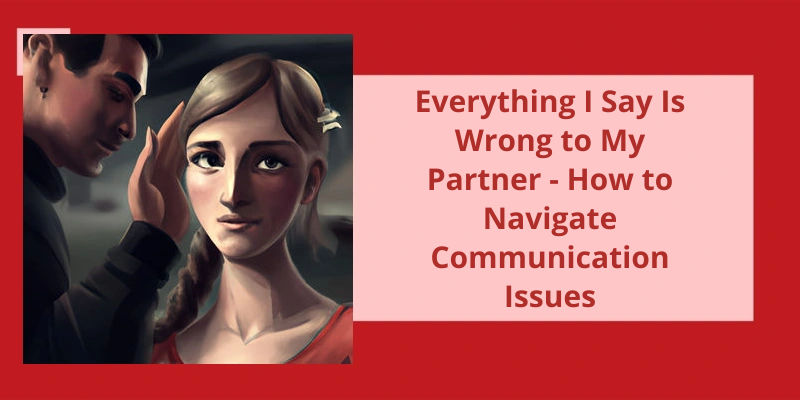The phrase "everything I say is wrong" is a common sentiment expressed by individuals in romantic relationships who feel unheard or invalidated by their partner. This feeling of constant invalidation can lead to frustration, anxiety, and a breakdown in communication. While it’s important to recognize and address any valid concerns or criticisms from a partner, feeling as though every word spoken is dismissed or rejected can be damaging to one's self-esteem and overall relationship satisfaction. In these situations, it’s important to communicate openly and honestly with one's partner, and perhaps seek out the assistance of a therapist or counselor to address underlying issues and improve communication skills.
What Do You Do When Your Partner Thinks Everything You Do Is Wrong?
First, it’s important to gather your thoughts and emotions before approaching your partner about the issue. It can be hurtful to constantly feel like everything you do is wrong, and it’s important to approach the situation calmly and with a clear mind. Take some time to reflect on how their behavior makes you feel and come up with some specific examples to discuss with your partner.
When you do approach your partner, try to avoid being accusatory or defensive. Instead, use “I” statements to explain how their behavior has been impacting you. For example, you could say “I feel really frustrated when you always assume Im wrong without giving me a chance to explain my reasoning.”
It’s also important to listen to your partners perspective and try to understand where theyre coming from. They may have their own reasons for always assuming youre wrong, such as past experiences or personal beliefs. By understanding their perspective, you may be able to find a way to work together to overcome this issue.
If you find that your partner is unwilling to acknowledge or change their behavior, it may be a sign of a larger issue in your relationship. It’s important to prioritize your own well-being and consider whether this is a dynamic youre willing to continue with long-term.
Ultimately, the key to addressing this issue is open and honest communication. By approaching the situation with empathy and a willingness to listen, you may be able to find a way to work together and strengthen your relationship in the process.
Seeking the Help of a Relationship Counselor: If Communication and Self-Reflection Do Not Work, It May Be Helpful to Seek the Guidance of a Professional Relationship Counselor. They Can Provide You With Tools and Techniques to Effectively Communicate With Your Partner and Address the Underlying Issues Causing the Problem.
Sometimes regular communication and self-reflection may not resolve issues in a relationship. In such cases, it’s advisable to seek the assistance of a relationship counselor who can provide you with techniques to communicate effectively with your partner and resolve issues causing problems.
It’s important to recognize the signs of a bad partner in order to maintain a healthy relationship. Some of these signs include lying, cheating, jealousy, and disrespect. Additionally, attempting to control a partner by keeping tabs on their whereabouts and social circle can also be indicative of an unhealthy dynamic. Understanding what constitutes a bad partner can help individuals make better choices in their romantic relationships.
What Does a Bad Partner Look Like?
A bad partner might also try to isolate their significant other from their friends and family. They may discourage them from pursuing their hobbies or passions, and instead insist on spending all their time together. This kind of behavior isn’t only controlling, but also emotionally abusive.
Another red flag to look out for in a bad partner is their communication style. They may constantly criticize or belittle their significant other, or make them feel like their concerns don’t matter. They may also be dismissive of their partners emotions or needs, and refuse to take responsibility for their actions.
In some cases, a bad partner may be physically abusive. This can include hitting, slapping, or pushing their significant other, or even using weapons against them. It can be easy to make excuses for this kind of behavior, but it’s never acceptable and should be taken seriously.
Ultimately, a bad partner is someone who makes their significant other feel unsafe or uncomfortable in any way. They may manipulate or gaslight them, or try to make them doubt their own feelings and judgment. It can be incredibly difficult to recognize these patterns of behavior, especially if the relationship has been going on for a long time. But it’s important to trust your instincts and seek help if you feel like youre in an unhealthy relationship.
Signs of Emotional Abuse in a Relationship
- Constant criticism or belittling
- Isolation from family and friends
- Control over finances or daily activities
- Extreme jealousy or possessiveness
- Blaming the victim for the abuser’s behavior
- Threats of harm or intimidation
- Gaslighting or manipulation
- Verbal abuse or yelling
- Withholding affection or emotional support
- Inflicting harm on pets or personal property
Source: What makes a relationship unhealthy? – Planned Parenthood
This can be detrimental to any marriage, as unresolved misunderstandings can lead to resentment, anger, and even divorce. In this article, we will explore the common causes of misunderstandings in marriages and provide tips for how to overcome them.
What Is Misunderstanding in Marriage?
This can be due to a lack of communication or the inability to adequately express ones thoughts and feelings. Misunderstandings can also arise from differing perspectives and beliefs about various aspects of the relationship, such as values, priorities, and expectations. It’s important to note that misunderstandings can happen even in the best of relationships, and it’s how couples handle them that can make all the difference.
Often, individuals enter into relationships with certain expectations about what their partner will or should do or be. When these expectations arent met, it can lead to feelings of disappointment and frustration, and can also create misunderstandings about why their partner is behaving in a certain way. It’s important for couples to openly discuss their expectations and work together to come to a mutual understanding of what each person wants and needs from the relationship.
Differing belief systems can also contribute to misunderstandings in marriage. For example, if one partner values independence and the other values togetherness, this can lead to misunderstandings about how much time the couple should spend together. Similarly, if one partner is more financially conservative and the other is more financially liberal, this can lead to misunderstandings about how money should be spent or saved. Couples may need to compromise and find ways to meet in the middle, or may need to work to better understand and respect each others beliefs.
Finally, unresolved conflicts and past hurts can also contribute to misunderstandings in marriage. If one partner has hurt the other in the past and the issue hasnt been fully resolved, it can create a feeling of mistrust and misunderstanding. Similarly, if a couple has frequent conflicts that are never fully resolved, it can create a sense of tension and unease that can lead to misunderstandings about each others thoughts and feelings.
By working to improve communication, openly discussing expectations and beliefs, and addressing past hurts and conflicts, couples can build stronger, more trusting relationships that are less prone to misunderstandings. With understanding and hard work, any couple can overcome the hurdles of misunderstandings and build a happy and fulfilling life together.
It’s not always easy to recognize when a relationship is no longer healthy for you. However, there are some signs to look out for. If the relationship is causing negative emotions, such as sadness, anger, and anxiety, or making you feel like you’ve compromised yourself, it may not be right for you. Additionally, if you notice changes in your personality or self-esteem, it may be time to reevaluate the relationship.
How Do You Know if a Relationship Is Wrong for You?
Another sign that a relationship is wrong for you is if your values and goals clash. If your partner is constantly pushing you to compromise on things that are important to you or if they don’t support your aspirations, you may begin to feel like the relationship is holding you back. This can lead to resentment and frustration, both of which aren’t conducive to a healthy partnership.
Communication is key in any relationship, and if there’s a lack of transparency and honesty between you and your partner, it may be a sign that things aren’t right. If you feel like you’re constantly walking on eggshells, or if your partner is unwilling to engage in open and honest conversations about your feelings, it may be time to reassess the relationship.
Trust is another crucial component of a healthy relationship, and if it’s been broken, it can be difficult to repair. If your partner has cheated on you, lied to you, or betrayed your trust in other ways, it may be difficult to move forward and rebuild that trust. Continuing in a relationship where there’s a lack of trust can lead to feelings of insecurity, jealousy, and low self-esteem.
If your partner is emotionally or physically abusive, it’s important to seek help and get out of the relationship as soon as possible. Abuse can have lasting effects on your mental and physical health, and no one deserves to be treated this way. If you feel like you’re in danger or if you need support, don’t hesitate to reach out to a trusted friend or professional for help.
Ultimately, the decision of whether to stay in a relationship or leave is a personal one, and it’s important to trust your instincts and listen to your gut. If something feels off or like it isn’t working, it’s worth taking the time to reflect and assess the situation. Ending a relationship can be difficult, but sometimes it’s the healthiest choice for both parties involved.
Signs of Emotional Manipulation in a Relationship
Emotional manipulation can be difficult to identify in a relationship, but some warning signs may include frequent guilt-tripping, gaslighting, or manipulating your emotions to make you feel responsible for their behavior. It’s important to recognize these signs and set boundaries to protect yourself from this type of behavior.
Conclusion
In conclusion, it’s a common phenomenon for individuals to encounter communication problems in their romantic relationships. One of the most devastating aspects of such challenges is when a partner consistently dismisses the other's perspectives, opinions, and feelings, and insists that everything they say is wrong. This kind of behavior can have a profound impact on the emotional and mental wellbeing of the recipient of such invalidation, leading to feelings of worthlessness, anger, and disconnection. Therefore, it’s essential for partners to learn effective communication strategies that promote respect, empathy, and understanding, and to seek professional help if necessary to work through such issues. Ultimately, every partner deserves to feel heard, valued, and respected, and it’s crucial to prioritize these fundamental aspects of any healthy and fulfilling relationship.






